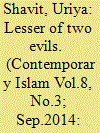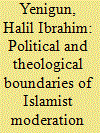| Srl | Item |
| 1 |
ID:
134221


|
|
|
|
|
| Publication |
2014.
|
| Summary/Abstract |
Through an analysis that focuses on wasati and salafi fatwas, but searches also beyond them, this article demonstrates the emergence of a broad agreement (albeit not a consensus) in Islamic jurisprudence on the permissibility of political participation in the West. This broad agreement is based primarily on jurists' evaluation, drawing on 'fiqh al-muwazanat' (the jurisprudence of balances) that, in some cases, participation brings more benefit (maslaha) than harm (mafsada). The article comparatively examines wasati and salafi approaches to politics and to Muslim minorities to explain why jurists who disagreed on other fundamental issues in the field of fiqh al-aqalliyyat al-Muslima (the religious law of Muslim minorities) reached similar (but not identical) conclusions on political participation. Based on this analysis, a revision of some prevailing categorizations of salafiyya is suggested. Deliberations by some salafis, jihadi-salafis and members of Hizb al-Tahrir who oppose political participation and their refutations of the justifications invoked by jurists who legitimized it are also examined.
|
|
|
|
|
|
|
|
|
|
|
|
|
|
|
|
| 2 |
ID:
149446


|
|
|
|
|
| Summary/Abstract |
This paper explores the repercussions of the apparent failure of Islamist experimentations with democracy during the Arab Spring in terms of the moderation hypotheses with a specific focus on the Egyptian case. I build on the existing arguments that repression may paradoxically moderate mainstream Islamist movements with certain caveats: when Islamists eventually come to power, their ideological vision also matters within the nexus of their strategic commitments and the on-going power struggles with other Islamist contenders. The prospects of democratisation, then, may also depend on the theoretical and political success of an Islamist political theology that accords better with rights and freedoms than a simplistic procedural democracy. Repression may indeed lead to moderation of the well-entrenched mainstream Islamist groups. However, such analyses focus only on those who remain within the fold of the mother organisation, rather than the splinter groups that break away with their more radicalised views. Under the post-Arab Spring conditions and given the Salafi factor, current views on the repression–moderation cycle must also account for the defection among certain Islamist constituencies towards jihadi or vigilante Salafism.
|
|
|
|
|
|
|
|
|
|
|
|
|
|
|
|